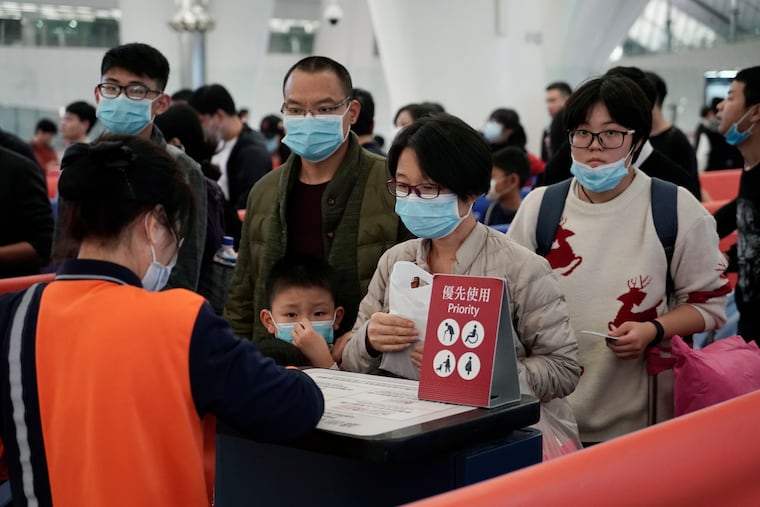Philly-area company gets $9 million grant to develop vaccine for new Chinese coronavirus
The company hopes to begin human testing of a vaccine within months.

Inovio Pharmaceuticals Inc. in Plymouth Meeting announced Thursday that it received a grant of up to $9 million to rapidly develop a vaccine for the new coronavirus that is spreading in China and sparking screenings at some U.S. airports.
The newly identified disease, which emerged last month in Wuhan, China, has sickened hundreds and killed at least two dozen, according to Chinese authorities. China on Thursday further cracked down on public transportation out of the city of 11 million. There have been a handful of cases outside of China, including one in the United States, in a man who had recently returned to Washington state from a trip to China. The U.S. is now screening passengers from Wuhan for signs of illness at airports in Atlanta, Chicago, Los Angeles, New York, and San Francisco.
» READ MORE: Coronavirus: What you need to know
The grant to Inovio comes from the Coalition for Epidemic Preparedness Innovations (CEPI), a partnership that receives money from public and private groups, including the Bill & Melinda Gates Foundation.
The company, which is collaborating with the Wistar Institute in Philadelphia, said the grant will be used to support testing of a vaccine against the new virus through phase one trials.
J. Joseph Kim, Inovio’s president and CEO, said the company’s approach to vaccine development is based on DNA sequencing, which is faster than traditional research requiring actual viruses or proteins from viruses. “Our goal is to be in human testing in less than six months in the United States,” he said. The company also hopes to work in China.
Unlike influenza, coronaviruses do not have a season, Kim said, so an outbreak can continue for years. Coronaviruses are a large family of viruses that can cause respiratory illness in humans and animals. Sometimes these viruses can move from animals to humans and then from person to person. That happened with Severe Acute Respiratory Syndrome (SARS) and Middle East Respiratory Syndrome (MERS).
The newly identified coronavirus, now called 2019-nCoV, causes fever, cough, and trouble breathing. An analysis this week from Peking University said it may have spread to people from snakes, who caught it from bats in a food market. It is also spreading among people.
Kim said that DNA sequencing of the new virus became publicly available on Jan. 11. Inovio, he said, was able to construct a vaccine within a “matter of hours.” It has named its candidate INO-4800.
David Weiner, a molecular immunologist who is executive vice president of the Wistar Institute and director of its Vaccine Immunotherapy Center, works closely with Inovio and serves on its board. He said the company grew from the work of his lab, then at the University of Pennsylvania.
Previous experiences with vaccine development are allowing Inovio’s team to speed the process, Weiner said. Scientists identify key proteins on a virus that should make good immune system targets. Then they code pieces of DNA to produce copies of those proteins, mix the DNA in a solution, and inject it into the skin or muscle. (For the extra curious, Weiner says DNA is a polymer that looks white and powdery, like salt.) Cells read the new DNA sequences and produce the newly designed proteins, which the body’s immune system identifies as invaders. Alarmed, it gears up for a fight. That makes it ready for a quicker, stronger immune response if it ever encounters the full virus.
CEPI earlier gave Inovio up to $56 million to develop vaccines against Lassa fever and MERS. The company said it is currently preparing to begin a phase two trial of its MERS vaccine in the Middle East.
Kim said that Inovio’s Zika vaccine went from “bench to human testing” in seven months.
Inovio was founded in 2000, Kim said. It now has 200 employees and expects to expand with the new grant.
CEPI on Thursday announced two other grants meant to combat 2019-nCoV. It is giving the University of Queensland in Australia up to $10.6 million to develop a “molecular clamp” platform for a vaccine. This is meant to help the body recognize the parts of viruses that attach to host cells. CEPI will also work with Moderna Inc. in Cambridge, Mass., to develop an RNA-based vaccine. The amount of that grant was not announced.
“We are definitely in a friendly competition,” Kim said. “You know, it’s for the betterment of the world.”
Until a vaccine is available, he said, leaders are on the right track in trying to prevent exposure to healthy populations.
“The authorities in China and elsewhere are doing exactly the right thing in identifying and isolating as much as possible,” he said.
Weiner said that he sees no reason for Americans to panic about the new virus. So far, we know of only the one case here. “It’s kind of like a fire in your neighbor’s house,” he said. “We should be helping and we should be putting out that fire.”
Weiner said he is glad that CEPI is mobilizing researchers, so we’ll soon be able to combat the infection.
For the new grant, Inovio is also working with VGXI, a subsidiary of GeneOne Life Science, which is based in South Korea, and Twist Bioscience in San Francisco.